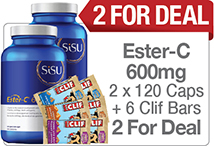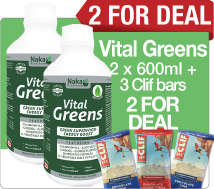Quercetin
Updated Mar. 21st, 2024
One of the most well known bioflavonoids is called quercetin. It is found in varying amounts in fruits, vegetables, leaves and even grains. The name is derived from the Quercus (oak) species of trees, which was the first known source of quercetin. Healthcare practitioners use quercetin in the treatment of cancer, allergies, inflammatory conditions, and in the protection of the cardiovascular system.
Benefits of Bioflavonoids
Bioflavonoids are essential for the proper absorption of vitamin C. The body cannot produce them directly, so they must be ingested through the diet. These molecules are generally very useful in the protection of the circulatory system by helping to strengthen the vein and artery walls. Bioflavonoids have also been long used to reduce excessive immune responses by inhibiting pro-inflammatory signalling molecules in the body. This helps them be of benefit in the treatment of autoimmune disorders and allergies. All bioflavonoids are also excellent antioxidants that help to neutralize free radicals and protect the body against toxins that promote aging and damage to the cardiovascular system. For more information on these and many other benefits, please see our Bioflavonoids article.
Quercetin Supplements Help in Preventing Cancer
Some preliminary research has indicated that quercetin supplementation may help to directly prevent and treat cancer. This has particularly been found in colon cancer cell lines, but all evidence is still in the test tube stage. Further research is required to be sure of these effects.
Helps in Preventing Inflammation and Allergies
Quercetin has also been shown to be anti-inflammatory and to directly help prevent incorrect immune responses like those involved in autoimmune conditions and allergies. In fact, supplementation with quercetin has been shown to stabilise certain immune cells, called mast cells, to prevent their release of histamine. Mast cells release histamine when they come into contact with an allergen. Histamine triggers other immune cells to migrate to the area so that the body mounts an immune response. It is this immune response that is responsible for allergic symptoms such as runny nose and itchy watery eyes. By preventing histamine release, quercetin can help to prevent environmental and skin allergies. For more information on this effect, please see our Autoimmune Disease and Allergy articles.
Helps in Improving Cardiovascular Health
Like many other bioflavonoids, quercetin can help to protect the vasculature and heart against damage. Some initial research has also found that quercetin can help to reduce LDL (“bad”) cholesterol and also help to reduce blood pressure as well. Some research has come out that contradicts the results of these studies, so further research is required to be sure of these effects. For other ways to protect the heart and lower blood pressure please see our Cardiovascular Health and Blood Pressure articles.
Using Rutin as a Precursor of Quercetin
Rutin is another bioflavonoid that can act as a precursor of quercetin. In fact, rutin is made up of quercetin bound to a double sugar molecule. In the body, rutin can be quickly converted to quercetin. Rutin has anti-inflammatory properties that help to reduce improper immune responses like those involved in autoimmune diseases and allergies. For more information, please see our Rutin article.
How Can I Get More Quercetin?
There are a wide variety of dietary sources of quercetin available. Some food sources are: black and green teas, capers, apples, red onion, red grapes, citrus fruit, tomato, broccoli, berries and leafy green vegetables. Please note that cooking, heat, light, oxygen and pollutants, like cigarette smoke, destroy bioflavonoids, so be sure to keep that in mind if you wish to get yours from food sources.
How Much Quercetin Supplements Should I Take?
Supplemental quercetin can be found alone or in combination with other bioflavonoids or nutrients for the treatment of many of the conditions listed above. The recommended dose of quercetin is between 300 and 1500mg daily in divided doses. For every 500mg of vitamin C supplemented, 100mg of bioflavonoids should also be used.























For years, I have been suffering from TERRIBLE allergies. At first I was given prescriptions after a while I decided to stop because I didn’t want to keep giving my body that every day. Afterwards, I even gave over the counter products a try and that didn’t work. As a result, I decided to give natural /supplements a try. While doing research online, I stumbled upon Quercetin. At first, I thought it had a funny name because I wasn’t sure how to pronounce it. I have to admit that it is LIFE CHANGING. After years of suffering from allergies, I finally found something that truly helps me. So I take it every day and all those uncomfortable symptoms stopped. I couldn’t believe that it works. I remember one day sitting in my living room and thinking, oh my I’m so happy that I haven’t had any symptoms for months ever since I started using Quercetin. My allergies were absolutely terrible and I hated it! It was simply too much to handle. I am more than happy to have found something that truly helps me on a daily basis. Please if you are suffering from allergies give it a try. I have recommended it to one of my friends who has terrible allergies too. She has since started taken it so that she can stop taking allergy shots.
Hello Tia,
Thank you for sharing this, we love hearing how our articles and natural supplements are helping people with their health. Quercetin is a great antioxidant that offers health benefits for the whole body, as well as supports environmental allergies. Many take this supplement for that reason. Plus, it's nice to know you're feeding your body naturally.
Stay healthy & breathe well!
The Nutritional Chart at the end of the article provides information in a clear, concise manner for the novice researching the subject. Quercetin is beneficial for a number of ailments and appears to assist in crucial areas such as heart function, allergies and inflammation. The layout of the article is effective as the reader readily views which foods contain quercetin. The language used in all the paragraphs is clear, concise and easy to understood for the person learning about quercetin. The benefits are evident as well as the procedure to combine vitamin C and quercetin. Valuable information in this article.
I have started taking quercetin upon the recommendation of my naturopath.
I have been taking Quercetin to combat allergies and it does help. It is something you take over time to see the benefits but most definitely better than taking medicines! I start using it in March so that spring blooms do not affect me severely and continue for about six months until the end of summer.
Hello Roger,
That's smart to start taking it early to give it time to take effect. Quercetin has many benefits including antioxidants and natural allergy relief. Since many people have to take allergy medication often during certain seasons, Quercetin is a great natural alternative. Here's our article on environmental allergies and other supplements that are beneficial.
https://www.nationalnutrition.ca/articles/health-concerns/allergies-environmental/
Have a healthy day.
After reading this concise, interesting article and the reviews I am definitely going to give this a try.
Hello Darlene,
We're not only glad to hear you enjoyed our article, but that you've found a supplement that can support your health concerns. Quercetin is a potent antioxidant and also supports allergy symptoms very well. If you'd like to learn more about antioxidants in general, check out this article too:
https://www.nationalnutrition.ca/articles/supplements/antioxidants/
Stay healthy & well!
Quercetin has worked for my allergies and I take it beginning of spring. It has helped me in terms of the lessening of my allergies. When I saw a Naturopathic doctor many years ago, she recommended I use Quercetin which was great advice. I take 1,500mg pill of a good brand that I purchase from National Nutrition. Great info in this article for anyone suffering from allergies. There are other benefits mentioned as well which is good to know.
Hello Roger,
Indeed, Quercetin is a great supplement to support seasonal allergies, we're glad it's helped you manage during those times of the year. It also has great antioxidant properties, we're glad you were able to learn more about this supplement with our article.
Stay healthy & well!
Who knew that quercetin is such a powerhouse! It seems like a superhero here to save the day, particularly if you have allergies or autoimmune conditions! Quercetin is so beneficial and it seems like it does even more good than originally suspected, but as stated more research is needed to be sure. Quercetin is definitely a superhero and definitely good to keep on hand. It was also good to know that it can be obtained from several food sources if you don't want to do supplementation.
Hello RoseWithThorns,
Quercetin does have many benefits, especially for those with allergies. It's also loaded with antioxidants which support overall health, fight free radicals and support healthy skin.
Since you've been enjoying our articles, perhaps you'll like our Youtube channel as well:
https://www.youtube.com/user/NTLnutrition
Have a healthy day!